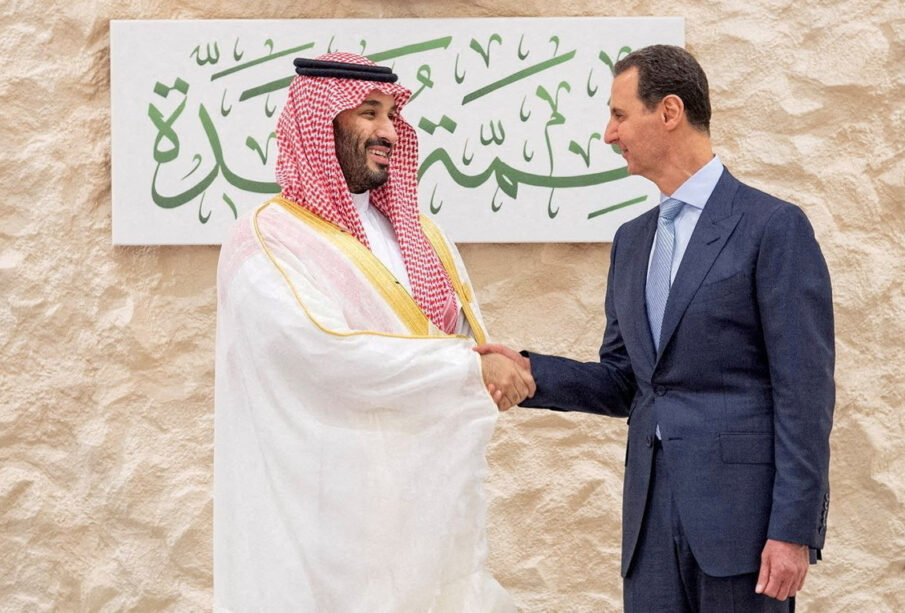Saudi embrace of Assad sends strong signal to US
 FILE PHOTO: Saudi Arabia's Crown Prince Mohammed bin Salman shakes hands with Syria's President Bashar al-Assad ahead of the Arab League Summit in Jeddah, Saudi Arabia, May 19, 2023. Bandar Algaloud/Courtesy of Saudi Royal Court/Handout via REUTERS
FILE PHOTO: Saudi Arabia's Crown Prince Mohammed bin Salman shakes hands with Syria's President Bashar al-Assad ahead of the Arab League Summit in Jeddah, Saudi Arabia, May 19, 2023. Bandar Algaloud/Courtesy of Saudi Royal Court/Handout via REUTERSOnce labelled a pariah, Saudi Crown Prince Mohammed bin Salman took centre stage as master of ceremonies last week when Arab states readmitted Syria to the Arab League, signaling to Washington who calls the regional shots.
His effusive greeting of President Bashar al-Assad at the Arab summit with kissed cheeks and a warm embrace defied U.S. disapproval at Syria’s return to the fold and capped a turnabout in the prince’s fortunes spurred by geopolitical realities.
The prince, known as MbS, seeks to reassert Saudi Arabia as a regional power by using his place atop an energy giant in an oil-dependent world consumed by the war in Ukraine.
Shunned by Western states after the 2018 killing of journalist Jamal Khashoggi by a Saudi hit squad, the prince has now emerged as a player whom Washington can neither disregard nor disavow, but must deal with on a transactional basis.
Skeptical of U.S. promises on Saudi security and tired of its scolding tone, MbS is instead building ties with other global powers and, regardless of Washington’s consternation, remaking his relations with their shared foes.
His blithe confidence on the world stage was not only visible in his reception of Assad. Ukrainian President Volodymyr Zelenskiy came to the Jeddah meeting and MbS offered to mediate between Kyiv and fellow oil producer Moscow.
To be sure Saudi Arabia still depends militarily on the United States, which saved it from possible invasion by Saddam Hussein’s Iraq in 1990, monitors Iranian military activity in the Gulf and provides Riyadh with most of its weapons.
Still, with Washington seemingly less engaged in the Middle East and less receptive to Riyadh’s anxieties, MbS is pursuing his own regional policy with less apparent deference to the views of his most powerful ally.
“This is a strong signal to America that ‘we’re reshaping and redrawing our relations without you’,” said Abdulaziz al-Sager, Chairman of the Gulf Research Center, of the summit.
“He is not getting what he wants from the other side,” Sager added, saying Saudi Arabia’s ententes with regional foes were based on Riyadh’s approach to regional security.
DIPLOMATIC OFFENSIVE
MbS’ position strengthened last year when Western economies turned to Saudi Arabia to help tame an oil market destabilized by the war in Ukraine. It created the opportunity for MbS to launch a diplomatic offensive that included high profile summit appearances.
That effort was aided when Washington declared MbS immune from prosecution for Khashoggi’s killing despite his being directly implicated in it by U.S. intelligence.
A visit by U.S. President Joe Biden last July had already demonstrated Riyadh’s returning influence: The American leader left empty handed while the prince enjoyed a public display of U.S. commitment to Saudi security.
The Saudi pivot away from reliance on the United States was meanwhile evident when China mediated this year a settlement between Riyadh and its arch regional foe Iran after years of hostility.
The deal was not made from a position of Saudi strength: Iran’s allies had come out stronger than those of the kingdom in Iraq, Syria and Lebanon, and held most of the populated territory in Yemen.
Still, it showed Riyadh was able to cut its losses and work with U.S. rivals and foes to shore up its regional interests such as cooling the Yemen war where Saudi forces have been bogged down since 2015.
Meanwhile the prince has improved ties with Turkey and ended a boycott of Qatar, a neighbour he considered invading in 2017 according to diplomats and Doha officials.
“Over the past three years, the hatchet was buried and relations were repaired,” said Saudi columnist Abdulrahman Al-Rashed in Asharq Al-Awsat newspaper.
TRANSACTIONAL RELATIONSHIP
A Gulf official said the new, more directly transactional, relationship with the United States had replaced the old oil-for-defence model because of what Riyadh saw as a shakier security umbrella after the Arab revolts of 2011.
A senior State Department official said the relationship is “an important eight-decade one that spans generations, across administrations in our own country and across leaders in Saudi Arabia”.
“We have multiple interests when it comes to our relationship with Saudi Arabia…Our policy and engagement will seek to ensure that our relationship remains sound and able to meet our shared challenges of the future.”
Riyadh thought Washington had abandoned old allies during the revolts and might abandon the Al Saud dynasty too. At the same time it believed the U.S. pursuit of a nuclear deal with Tehran had led Washington to ignore the growing activity around the region of Iranian proxies seen by Riyadh as a threat.
That impression has strengthened. A Saudi source close to the ruling inner circle pointed to what he saw as lax enforcement of sanctions on Iran and a drawdown in Syria, where a small U.S. contingent has denied territory to Iran’s allies.
“I think countries in the region, as a consequence, will do what is best for them,” he said.
Meanwhile, Riyadh was annoyed that the U.S. pulled its support for Saudi operations in Yemen, launched after Washington repeatedly urged the kingdom to take responsibility for its own security.
Without direct American intervention or support for its own military efforts, Riyadh had little choice but to strike a deal with Iran even if that annoyed Washington, the source said.
“This is a consequence of the U.S. action,” he added.
Each side has a list of requests that the other is not willing to grant, the Gulf official said.
However both sides may have little choice but to put aside their grudges.
The kingdom may see the U.S. security umbrella as weakened, but still views it as crucial to Saudi defence. Western states have meanwhile remembered that Riyadh’s influence in a volatile oil market requires them to banish their qualms and deal with its de facto ruler and future king.
SOURCE: REUTERS










